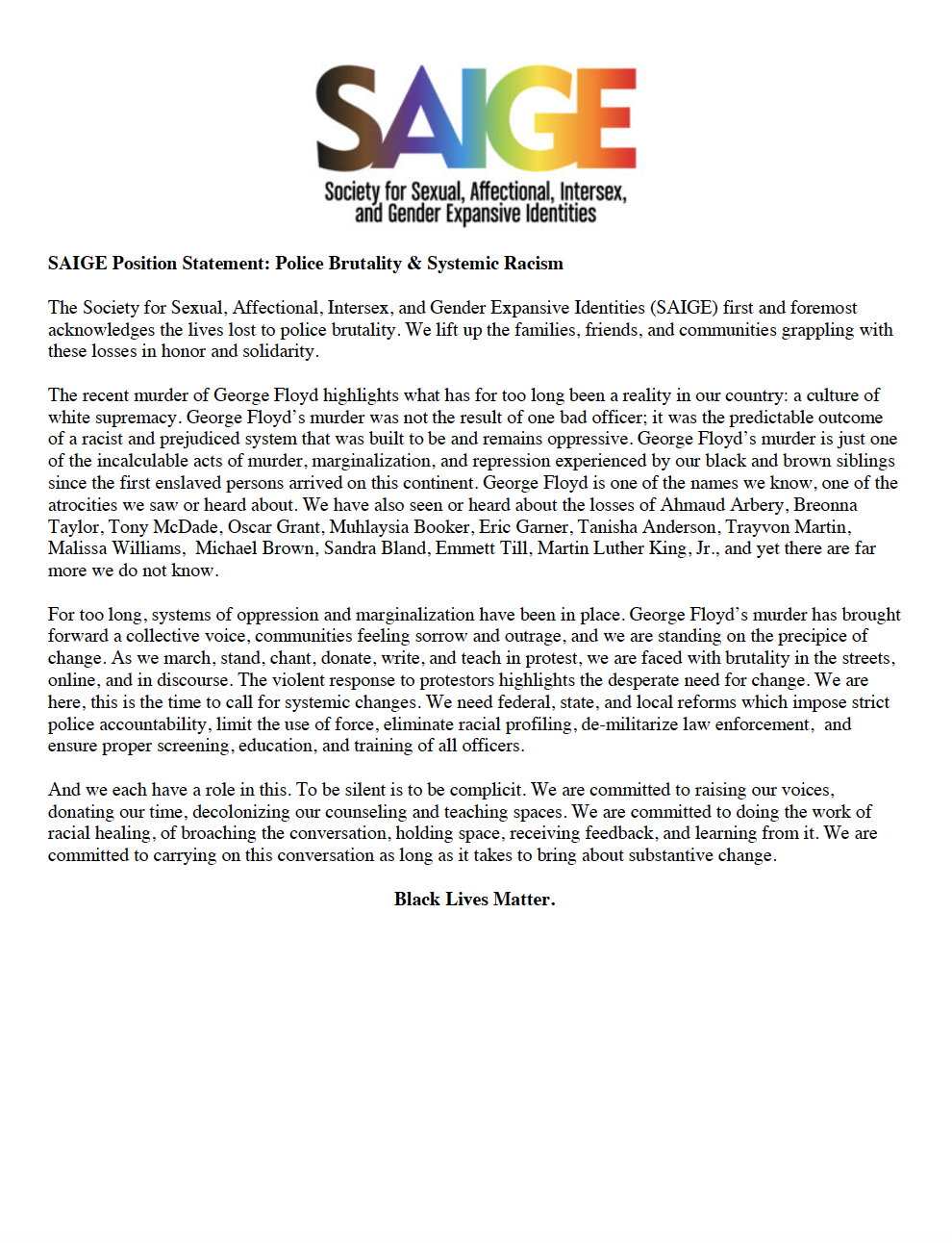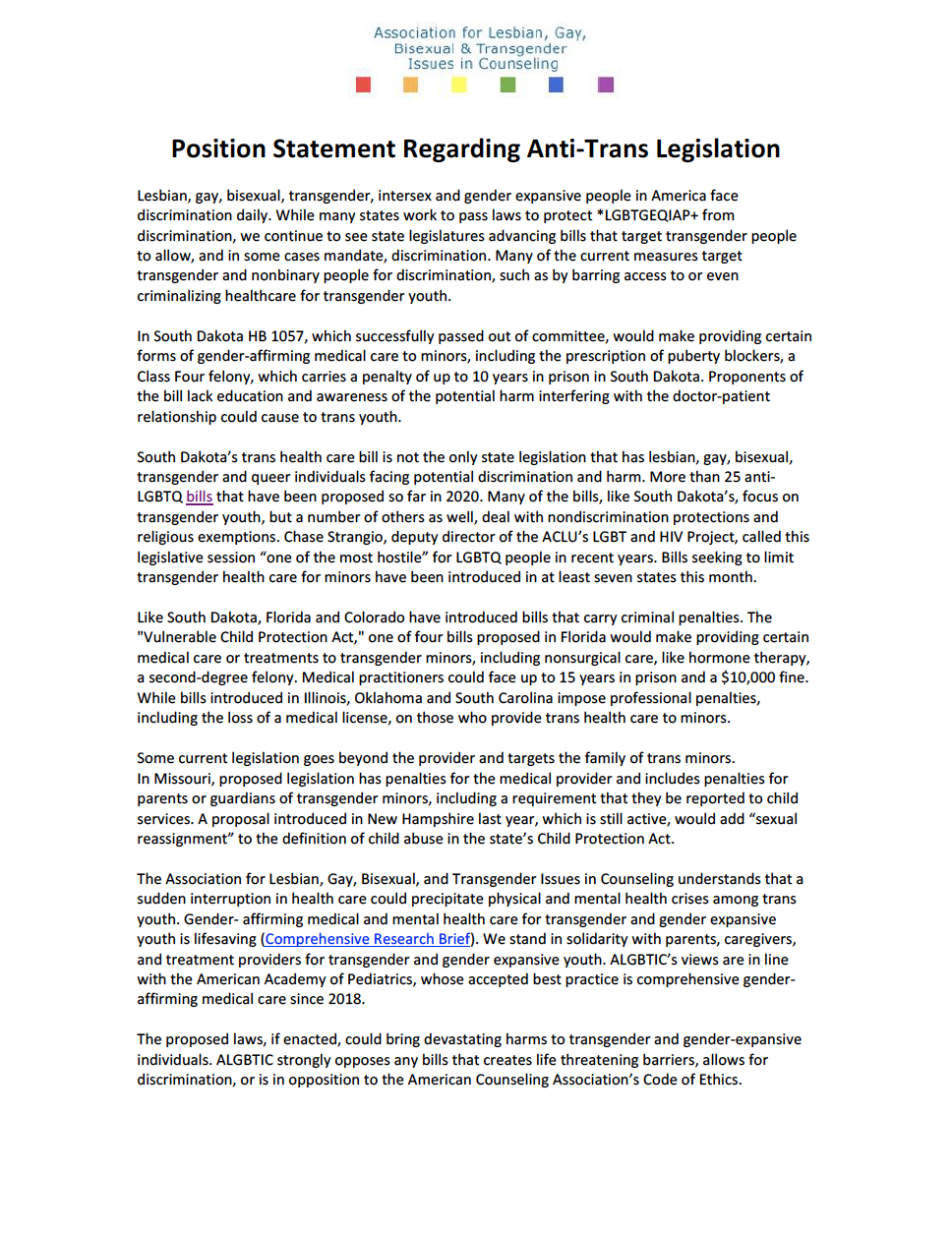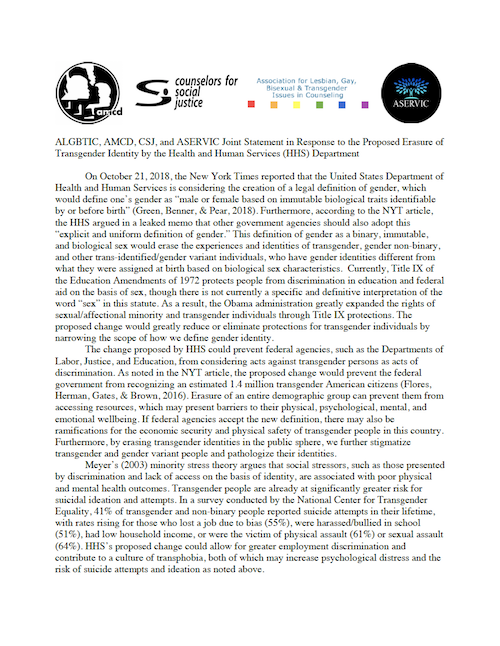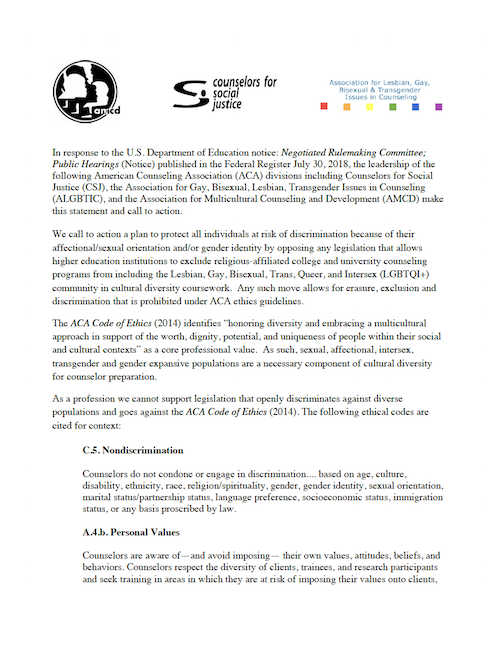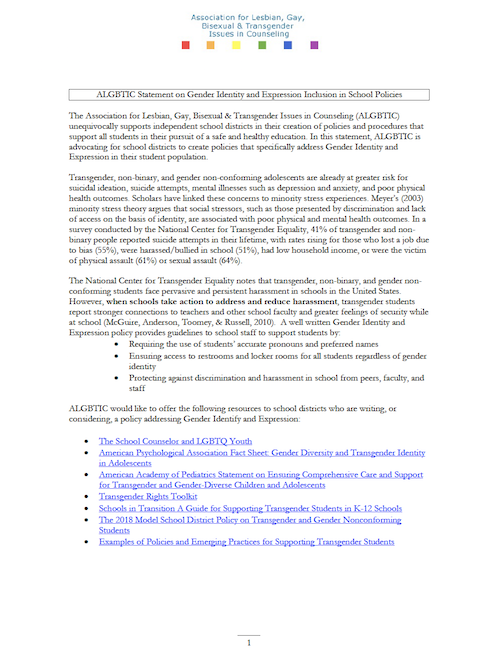Click here for the HHS Report Statement
Click here for the statement regarding National Child Abuse Prevention Month
Click here for the 2025 Statement on the Presidential Executive Orders
Click here for the 2024 Post-Election Statement and Resources
Society for Sexual, Affectional, Intersex, and Gender Expansive Identities’ Position Statement on Pro-Conversion Therapy Legislation
The recent and alarming rise of anti-LGBTQ+ legislation and the preceding shifting of the Overton window have caused a resurgence of support for conversion therapy, especially for transgender and gender diverse individuals. Conversion therapy is the practice of attempting to change an individual's sexual orientation, gender identity, or gender expression to align with heterosexual and cisgender norms. It is based on the belief that being a member of the LGBTQ+ community is an aberration, which is irrefutably false. In the face of these bills and laws, the Society for Sexual, Affectional, Intersex, and Gender Expansive Identities (SAIGE) upholds the values of our profession and our organization in opposing conversion therapy in all forms.
Conversion therapy for members of the LGBTQ+ community is dangerous and actively leads to harm. The practice is demonstrably pseudoscientific, and the suffering it causes has been acknowledged by many who formerly created and promoted it. Certain governmental jurisdictions are attempting to either force conversion therapy to be used in clinical therapeutic practice or forbid state mental healthcare boards from banning these overtly harmful modalities. There are also legislators in some states working to protect parents who seek to send their LGBTQ+ children to conversion therapy. Additionally, abroad, at least one regulatory organization is undermining national efforts to ban conversion therapy due to the inclusion of children in said ban. Those seeking to permit the practice of conversion therapy are seeking to persecute the LGBTQ+ community through the promotion of a practice that multiple medical and mental healthcare organizations have denounced. Conversion therapy worsens mental health outcomes, resulting in severe issues ranging from depression to substance abuse to suicide. People who want these practices permitted are essentially advocating for pain and death. We at SAIGE seek to remind our membership, our legislators, and our communities of conversion therapy’s legacy and strongly urge all entities with such authority to enact bans on conversion therapy to protect LGBTQ+ individuals from this harm. These conversion therapy bans are grounded in science and the endorsement of evidence-based practices, which every iteration of conversion therapy is not.
Society for Sexual, Affectional, Intersex, and Gender Expansive Identities’ Position Statement on Gender-Affirming Healthcare Bans
Over 115 pieces of legislation have been introduced in state legislatures in 2023 that focus on banning aspects of gender-affirming medical care for transgender and gender expansive Americans1. Transgender and gender expansive individuals experience significant mental health disparities, including increased depression, anxiety, and suicidality, not because of their identity but because of the way that people respond to their authenticity2. Restricting access to gender affirming care is discrimination. These bills and laws seeking to ban or restrict access to care further perpetuate discriminatory attitudes towards transgender and gender expansive individuals3. Similar legislative efforts that invoke “conscientious objection” to providing these important medical interventions are no better than the bans and still have the same harmful impact on clients seeking care. In the face of these bills and laws, the Society for Sexual, Affectional, Intersex, and Gender Expansive Identities (SAIGE) upholds the American Counseling Association’s commitment to the prevention of harassment in all forms - verbal, physical, sexual, emotional, and psychological - including standing up for the basic human rights of transgender, gender expansive, and LGBTQ+ individuals4.
Gender-affirming interventions are not new or novel and have a well-established use for both cisgender and transgender youth5. Gender-affirming medical procedures and mental health care are essential and endorsed by American Academy of Pediatrics, the Endocrine Society, the American Academy of Family Physicians, American Psychiatric Association, the American Academy of Child and Adolescent Psychiatry, the American Medical Association, the United States Association for Transgender Health, and the World Professional Association of Transgender Health. SAIGE’s own Competencies for Counseling Transgender Clients6, which have been endorsed by the American Counseling Association7, call for counselors to embrace the full spectrum of gender identity and expression, affirm transgender mental and medical care, and serve as advocates for transgender individuals. Provision of affirming medical care is evidence-based best practice when working with transgender individuals.
SAIGE recognizes these bills and laws have a damaging psychological effect on an already marginalized group and therefore stands in solidarity with transgender and gender expansive individuals targeted by these acts of legislated hate, in addition to their medical and mental health care providers, their families, and their support systems. SAIGE strongly opposes any prejudicial bills and laws that are in opposition to the ACA’s Code of Ethics and/or SAIGE’s Competencies for Counseling with Transgender Clients.
Drafted by: Gene N. Dockery, MA, LPC, NCC – SAIGE Public Policy Committee Chairperson; Edited by: Valeo L. Khan-Snyder, MS, tLMHC, NCC & Brandon R. Tomlinson, PhD, LPCC, NCC– SAIGE Public Policy Committee Members
Society for Sexual, Affectional, Intersex, and Gender Expansive Identities’ Position Statement on Anti-Transgender Sports Bans and Laws
The Protection of Women and Girls in Sports Act of 2023 has been introduced to the U.S. House of Representatives. Similar bills have been introduced into more than twenty states in 2023 alone, and some have passed into law. These bills require schools and organizations to consider eligibility for sports on the basis of sex assigned at birth and are therefore discriminatory to intersex, transgender, and gender expansive individuals. These bills and laws are prejudice disguised as equality and misrepresent the complexities of biology. There is no scientific evidence that transgender or gender expansive children perform at a level that disadvantages their cisgender peers in sports. Laws that allow and/or mandate discrimination toward intersex, transgender, and gender expansive individuals are recognized by the Society for Sexual, Affectional, Intersex, and Gender Expansive Identities (SAIGE), a division of the American Counseling Association (ACA), to be harmful.
In the face of these bills and laws, SAIGE maintains the ACA’s commitment to advocate for nondiscrimination and the prevention of harassment. Per a position statement from the ACA, this commitment includes, but is not limited to, “access to learning environments that are free of discrimination, bullying, and harassment; access to restrooms and changing facilities that are safe and affirming for gender non-conforming youth and adults; and use of preferred names.” Laws that unfairly discriminate against intersex, transgender, and gender expansive individuals’ right to be accepted as their authentic selves can and often ultimately do precipitate mental health crises among intersex, transgender, and gender expansive youth. SAIGE recognizes these bills and laws have a negative psychological impact and stands in solidarity with intersex, transgender, and gender expansive individuals prejudicially targeted by these laws. SAIGE strongly opposes any discriminatory bills and laws that are in opposition to the ACA’s Code of Ethics and/or SAIGE’s Competencies for Counseling with Transgender Clients.
Drafted by: Valeo L. Khan-Snyder, MS, tLMHC, NCC – SAIGE Public Policy Committee Member; Gene N. Dockery, MA, LPC, NCC – SAIGE Public Policy Committee Chairperson; Edited by: Brandon R. Tomlinson, PhD, LPCC, NCC – SAIGE Public Policy Committee Member
Society for Sexual, Affectional, Intersex, and Gender Expansive Identities’ Position Statement on Parental Rights Bills/Laws
In 2022, the legislature for the State of Florida passed, and Governor DeSantis signed, a bill into law, called the Parental Rights in Education Act. This law entails specifically a section that prohibits the discussion of sexuality and gender identity issues, written as follows: “Classroom instruction by school personnel or third parties on sexual orientation or gender identity may not occur in kindergarten through grade 3.”[i] This was done under the guise of “fundamental right of parents to make decisions regarding the upbringing and control of their children in a specified manner.”[ii] Now, states across the country are adopting or attempting to adopt similar laws.[iii] While these laws claim to work toward ensuring students’ parents (especially students in the age groups of kindergarten through third grade) rights to teach their children about such subject matter, the reality is that these laws prohibit schools from discussing fundamental matters of humanity like sexual orientation and gender identity.[iv] This has been shown to be a metric for bad actors and propagators of hateful ideologies to enforce their beliefs on children[v] because they errantly believe that people being not straight or cisgender is a fundamental malformation of the human identity rather than a rich and natural feature of life.[vi]
What this does do is potentially deprive young children still in the midst of discerning their own identities, because a child’s understanding of their orientation has been shown to develop as early as toddlerhood. [vii] When people assert that schools should not address orientation and identity issues, they deny an opportunity for students to receive ideas they can use to understand themselves. The evidence that obstructing people (children included) from exploring their identity has a profoundly negative effect on their mental health in the short and long term is extensive.
We at SAIGE believe that curtailing the education of children by constricting schools from talking about an ineffable fact of life out of a politically motivated attempt to push an anti-LGBTQIAP+ agenda runs counter to the core ethics of the counseling field intended to “promote respect for human dignity and diversity.” [viii]
[i] The Parental Rights in Education Act, no. HB1557, Florida House of Representatives (2022). https://www.flsenate.gov/Session/Bill/2022/1557/BillText/er/PDF
[ii] The Parental Rights in Education Act, no. HB1557, Florida House of Representatives (2022). https://www.flsenate.gov/Session/Bill/2022/1557/BillText/er/PDF
[iii] Jones, D., & Franklin, J. (2022, April 10). Not just Florida. More than a dozen states propose so-called “Don’t Say Gay” bills. NPR. https://www.npr.org/2022/04/10/1091543359/15-states-dont-say-gay-anti-transgender-bills
[iv] Under fire: The war on LGBTQ people in America. (2023). Movement Advancement Project. https://www.mapresearch.org/file/MAP_Under%20Fire%20Report.pdf
[v] Berger, E. (2022, April 4). How Florida’s ‘don’t say gay’ law could harm children’s mental health. The Guardian. https://www.theguardian.com/us-news/2022/apr/04/florida-dont-say-gay-bill-children-mental-health
[vi] Kinney, R. L. (2015). Homosexuality and scientific evidence: On suspect anecdotes, antiquated data, and broad generalizations. The Linacre Quarterly, 82(4), 364–390. https://doi.org/10.1179/2050854915Y.0000000002
[vii] Putnam, D. (2022, March 28). Florida’s anti-gay bill is wrong. It’s also unconstitutional. NBC News. https://www.nbcnews.com/think/opinion/florida-hb-1557-anti-gay-parental-rights-education-violates-free-ncna1293466
[viii] ACA Code of Ethics. (2014). American Counseling Association. https://www.counseling.org/resources/aca-code-of-ethics.pdf
2023 Society for Sexual, Affectional, Intersex, and Gender Expansive Identities’ Position Statement on Anti- LGBTGEQIAP+ Legislation
More than 320 pieces of legislation targeting queer and trans people have been introduced in state legislatures across the country as of February 18th, 2023 (ACLU, 2023). These pieces of legislation include threats to LGBTGEQIAP+ people by targeting access to accurate identification information, civil rights legislation, free speech and expression, healthcare, public accommodations, schools and education, and other issues that target queer and trans communities across our country. These legislative attacks continue to primarily target gender expansive youth. SAIGE recognizes how necessary it is to protect the physical and mental health of LGBTGEQIAP+ individuals in this country. Legislation that allows and/or mandates discrimination toward queer and transgender individuals are recognized by our association to be harmful.
We at SAIGE acknowledge that systems of oppression including harmful legislation contribute to adverse mental health outcomes including increased risk of suicidal ideation and suicide attempts. As counselors, we commit to nondiscrimination and the prevention of harassment and are committed to the well-being of these communities. According to the American Counseling Association Nondiscrimination Position Statement, this commitment includes, but is not limited to, “access to learning environments that are free of discrimination, bullying, and harassment; access to restrooms and changing facilities that are safe and affirming for gender non-conforming youth and adults; and use of preferred names.” SAIGE recognizes the negative psychological impact that anti-LGBTGEQIAP+ legislation has on these populations across the country. We stand in solidarity with those who are being targeted by this harmful legislation, and we stand in opposition to legislation that unfairly targets LGBTGEQIAP+ individuals, their families, and medical and mental health professionals who work with these populations.
The American Counseling Association is committed to nondiscrimination and to the prevention of harassment in all forms—verbal, physical, sexual, emotional, and psychological—including protections for transgender, gender non-conforming, and LGBTQ+ individuals. Every human being on earth is unique and uniquely important. Each person embarks on the adventure of life guided by their own spirit, outlook, and traits of character. These facets help to shape and guide the course of every human journey. Everyone is equal on this path.
Unified Statement on Anti-LGBTGEQIAP+ Legislation
As of March 11, 2022, more than 150 pieces of legislation targeting queer and trans people have been introduced in state legislatures across the country (ACLU, 2022). Just four months in, this has already been a watershed year for anti-LGBTGEQIAP+ (lesbian, gay, bisexual, transgender, gender expansive, queer, intersex, asexual, pansexual+) legislation. These bills currently exist in 31 states, and this threatens the future for individuals in the community nationwide. While anti-LGBTGEQIAP+ legislation is not a new phenomenon, the state level attack against equality follows a number of improvements at the federal level. These attacks place transgender, non-binary, and other gender non-conforming youth amongst the most targeted groups at this time. While not all issues for all members of the LGBTGEQIAP+ community are the same, they all share oppression and are targeted by this legislation
We know that 94% of LGBTQ+ youth have reported that recent political attacks have negatively impacted their mental health (Trevor Project, 2021). LGBTGEQIAP+ youth are already at a heightened risk of experiencing depression, anxiety and other mental health disorders (NAMI, 2022). Research also shows that LGBTGEQIAP+ youth are significantly more likely than their heterosexual, cisgender peers to experience suicidal ideation and attempts at suicide (NAMI, 2022). Half of all LGBTQ+ youth of color reported discrimination based on their race/ethnicity in the past year, including 67% of Black LGBTQ youth and 60% of Asian/Pacific Islander LGBTQ youth (Trevor Project, 2021). As professional counselors, we are committed to the well-being of these communities. These bills, and those like them, threaten these communities and stand in opposition to our core professional values:
- enhancing human development throughout the lifespan;
- honoring diversity and embracing a multicultural approach in support of the worth, dignity, potential, and uniqueness of people within their social and cultural contexts;
- promoting social justice;
- safeguarding the integrity of the counselor–client relationship; and
- practicing in a competent and ethical manner (ACA, 2014, p. 3).
The following divisions and affiliate organizations of the American Counseling Association (ACA), Association of Counseling Sexology and Sexual Wellness (ACSSW), the Society for Sexual, Affectional, Intersex, and Gender Expansive Identities in Counseling (SAIGE), the Association for Counselor Education and Supervision (ACES), the Association for Multicultural Counseling and Development (AMCD), the Association for Specialists in Group Work (ASGW), the International Association of Marriage and Family Therapists (IAMFT), the Association for Child and Adolescent Counseling (ACAC), the Association for Creativity in Counseling (ACC), the American College Counseling Association (ACCA), the Association for Humanistic Counseling (AHC), the Association for Assessment and Research in Counseling (AARC), Counselors for Social Justice (CSJ), and The International Association of Addictions and Offender Counselors (IAAOC) stand in solidarity with ACA’s nondiscrimination statement:
The American Counseling Association is committed to nondiscrimination and to the prevention of harassment in all forms—verbal, physical, sexual, emotional, and psychological—including protections for transgender, gender non-conforming, and LGBTQ+ individuals. Every human being on earth is unique and uniquely important. Each person embarks on the adventure of life guided by their own spirit, outlook, and traits of character. These facets help to shape and guide the course of every human journey. Everyone is equal on this path.
The ACA Governing Affairs Resources:
https://www.counseling.org/government-affairs/public-policy
The ACA Code of Ethics:
https://www.counseling.org/resources/aca-code-of-ethics.pdf
The CSJ Code of Ethics:
Ibrahim, F.A., Dinsmore, J.A., Estrada, D., & D'andrea, M. (2011). The Counselors for Social Justice (CSJ) Code of Ethics.
LGBQQIA Competencies:
Counseling Competencies for LGBQQIA People in pdf
Transgender Competencies:
Counseling Competencies for Transgender Clients in pdf
Multicultural Social Justice Counseling Competencies (MSJCC):
https://www.multiculturalcounselingdevelopment.org/competencies
Resources for Further Support:
Crisis Help: The Trevor Project | 24 Hour Telephone (866) 488-7386 | We're here for you Now – The Trevor Project | Trans Lifeline (877) 565-8860 Peer support phone service run by and for transgender people.
TransSOCIAL (Transgender-led organization): TransSOCIAL, Inc.. Services and resources include: Name and gender marker change assistance, case management, peer support and social groups, and affirming medical and mental health referrals.
National Queer & Trans Therapists of Color Network (Healing justice organization): National Queer and Trans Therapists of Color Network | Services and resources include: Mental Health Practitioner Directory and an online assistance to help connect queer and trans people of color to queer and trans practitioners of color and supplemental financial assistance for psychotherapy (Mental Health Fund).
Glimmer: Glimmer | Platform for helping LGBTQIA+ people connect with affirming wellness professionals.
Statement crafted by Christina McGrath Fair, chair of ACSSW Social Justice & Advocacy committee. Special thanks to Tamekia Bell (SAIGE), Devika Dibya Choudhuri (ASGW), Angela Cocker (AMCD), Delilah Owens (CSJ), Deborah Rubel (ACES), Angela Schubert (ACSSW), Carol Smith, and Shon Smith (CSJ) for feedback and contributions to this statement.
Queer & Trans Advocacy
Our Public Policy Committee provides assistance for our members on local, state, and national public policy issues impacting LGBTGEQIAP+ clients.
Even though we have made much progress for Queer and Trans rights, there are many continued Social Justice Issues that continue to impact the lives of our clients, as well as our counseling work with our clients.
SAIGE seeks to assist our members with advocacy efforts, as well as to provide specific statements for use by state and regional organizations.
Below we include our previous statements and responses.
Read SAIGE's endorsement of Equitable Access to Competent Counseling: Mandatory Education on Counseling Transgender and Nonbinary Individuals, Families, Groups, and Communities from an Intersectional Perspective (2020). 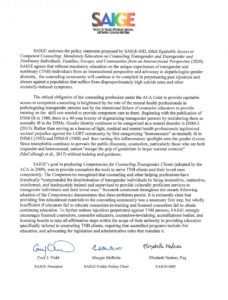
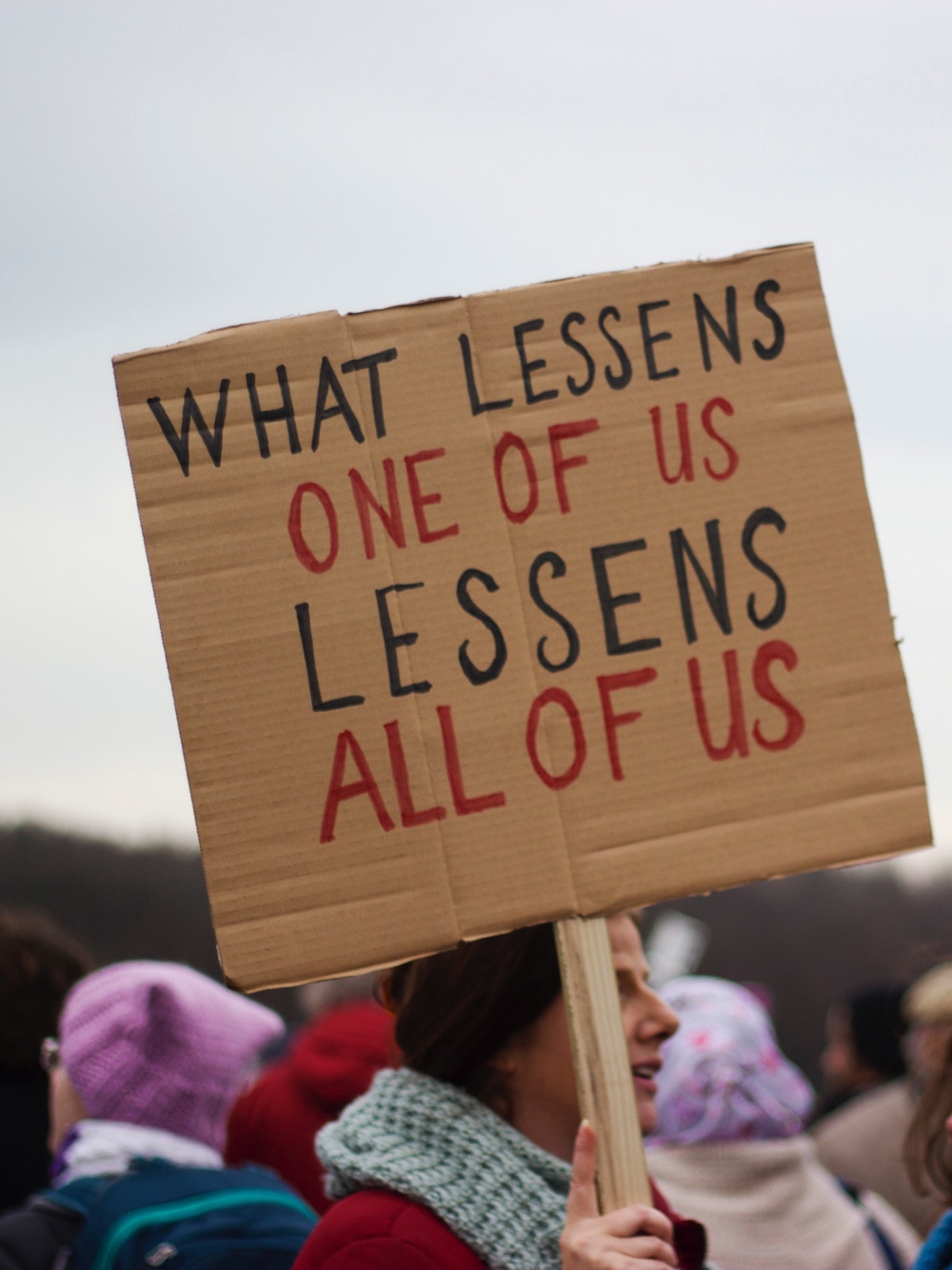
Need Assistance with Advocacy?
Our public policy committee responds to and assists members with LGBTQIAPG+ advocacy efforts.

